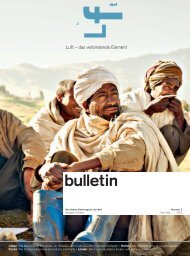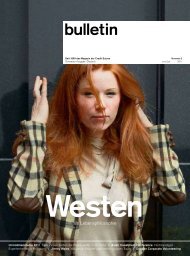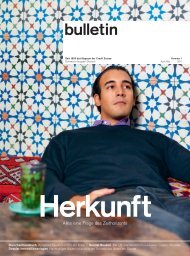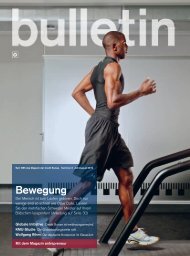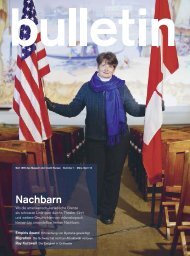You also want an ePaper? Increase the reach of your titles
YUMPU automatically turns print PDFs into web optimized ePapers that Google loves.
GLOBAL INVESTOR 1.16 — 29<br />
fashion makers and consumers in shaping<br />
fashion?<br />
ROGER TREDRE Consumers are now<br />
in a more powerful position than ever before<br />
because of the power of the Internet and<br />
the ability to like and dislike. And also the<br />
extent to which they are using the old-fashioned<br />
retail environment as a showroom<br />
experience where they can wander around,<br />
try on things, take a few pics, share them<br />
with friends and then go home and buy the<br />
items cheaper online. At the same time,<br />
despite the best efforts of NET-A-PORTER<br />
or ASOS in the UK market, nothing quite<br />
matches the thrill of going into a beautiful<br />
shop. Consequently, retail is adding cafés,<br />
adding drama and building bigger flagships.<br />
How is the evolution of the mass market<br />
affecting the luxury segment?<br />
ROGER TREDRE If you’re in the business<br />
of luxury, you’ve got a problem in<br />
competition from the high street who are<br />
now able to use better-quality fabrics,<br />
are creating more fashion-forward designs<br />
and are even able to add in elements of<br />
handiwork that were previously only associated<br />
with the luxury sector. Nonetheless,<br />
luxury brands are also lifestyle brands and<br />
well aware of it. And they want to capture<br />
a share of the mid-market. “Masstige” –<br />
“mass market” plus “prestige” – is a phrase<br />
that’s been used quite a lot in recent years.<br />
In 1992, you wrote that uncertainty in the<br />
industry internationally had dampened<br />
many wilder spirits. What was going on?<br />
ROGER TREDRE Japan, which had been<br />
a key export market at the luxury end,<br />
was no longer growing at the same pace.<br />
The question was where growth would<br />
come from, and the answer was China. It<br />
took a good decade, though, before China<br />
began to deliver in the way people hoped.<br />
What challenges is the industry facing?<br />
ROGER TREDRE One of the biggest<br />
talking points for the industry at the moment<br />
is whether we need to change the timetable<br />
of fashion. In the late 1990s, the emergence<br />
of Inditex – the Spanish company<br />
that owns Zara – introduced the concept of<br />
fast fashion, the idea of stores injecting<br />
new product into shops on almost a weekly<br />
basis. This presented a major challenge<br />
for everyone in the industry: companies,<br />
designers and producers would have to leap<br />
on it immediately and make it happen.<br />
And now?<br />
ROGER TREDRE It’s reached the stage<br />
where some high-end companies, including<br />
Roger Tredre<br />
is currently pathway leader in fashion<br />
journalism (MA <strong>Fashion</strong> Communication)<br />
at Central Saint Martins, University<br />
of the Arts London. He is also a senior<br />
consultant for the Beijing Academy<br />
of Creative Arts. From 1999 to 2007,<br />
he was editor in chief of Worth Global<br />
Style Network (wgsn.com), the international<br />
fashion industry online trends<br />
and research service.<br />
Burberry (most notably at London <strong>Fashion</strong><br />
Week), are proposing a see-now, buy-now<br />
approach to the concept of a fashion show,<br />
where the consumer will be able to watch<br />
the fashion show on the Internet and place<br />
an order and get the clothes almost instantly.<br />
How likely is that to happen?<br />
ROGER TREDRE If it is adopted across<br />
the industry, it will need a complete rethink<br />
in terms of the production process. I don’t<br />
think it will happen. A lot of the bigger<br />
players in continental Europe have already<br />
suggested it’s a bit of a gimmick and<br />
“Consumers are<br />
now in a more powerful<br />
position than<br />
ever before because<br />
of the power of the<br />
Internet and the ability<br />
to like and dislike.”<br />
that part of the mystique and allure of<br />
selling dreams is the idea that you see these<br />
clothes in the fashion show and then you<br />
have to wait.<br />
Is the distinction between fashion and<br />
apparel worth making?<br />
ROGER TREDRE Apparel needs an<br />
injection of fashion. I mean, what’s apparel?<br />
It’s essentially basics. Take the case of<br />
Uniqlo – a Japanese retailer with huge ambitions<br />
that has enjoyed a meteoric rise in<br />
recent years. When it first came to the UK,<br />
it was purely apparel-focused. But once<br />
you’d bought an item, you didn’t need to go<br />
back to the shop again for a very long<br />
time. The company realized that apparel<br />
without any fashion sprinkled into the mix<br />
was dullsville. Uniqlo has since had a<br />
whole series of collaborations working with<br />
designers to inject a fashion element in<br />
what is still quite a basic range of clothing.<br />
How is fashion understood and<br />
misunderstood in society?<br />
ROGER TREDRE If you believe the<br />
Zoolander movies, fashion is full of ludicrous<br />
figures who drink a lot of champagne,<br />
do drugs and behave generally outrageously.<br />
And it’s true that, from the outside, the<br />
fashion runway season is super- glamorous.<br />
But inside it are a lot of people who<br />
work very, very hard. I’m always amazed at<br />
the commitment and the length to which<br />
people will go in the fashion industry.






